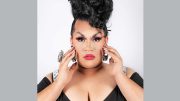Slowly but surely, Marvel Studios is working on fixing its diversity problem. Calls for non-white and female leads have been heard loud and clear, and we’ll be seeing both in the years to come. There’s still some frustration that, say, Black Widow (Scarlett Johansson) can’t get her own standalone film, or that black characters have been relegated to sidekick roles until recently. Nevertheless, films like Black Panther and Captain Marvel have been added to Marvel’s rollout schedule, so these issues are in the process of being remedied.
However, there’s one area where Marvel Studios has still fallen well short of what many would like to see. There’s been almost no presence of LGBT characters (let alone leads) in the sprawling Marvel Cinematic Universe, and many would like to see this problem fixed as well. On the bright side, an article at After Ellen quoted studio creative director Kevin Feige as saying that there will indeed be at least one on-screen LGBT character. The downside is that he specified this would happen in 10 years or less. That’s an awfully long deadline to set for righting a situation that a lot of people are tired of seeing.
So what could Marvel do to speed up the process of LGBT representation? There are a few ideas that shouldn’t be too difficult to get moving on.
Publicize New Comics
Marvel is actually taking positive steps where its comic books are concerned. We learned a little while ago that there would be a new X-Men series revolving around Iceman, who came out a few years ago but hasn’t really headlined his own series before. And as Comics Alliance reported, there will also be an ongoing comic for Ms. America, who, like Iceman, is a member of the LGBT community. It’s great that these comics are both being written and produced, but Marvel would do well to publicize them more than the average new issues. They shouldn’t go overboard, but the statement shouldn’t be wasted or overlooked either.
Inject LGBT Characters Into Games
Video games might seem nearly as involved as cinematic projects, and in some cases that’s fairly accurate. But Marvel has excelled most with relatively simple games that seem easy to produce. Some of the highest activity Marvel gaming, for instance, takes place at online casino platforms, where games follow traditional formats but are tied thematically to films and characters. Betfair’s assortment of games includes glimpses of the X-Men, the Avengers, the Fantastic Four, and even a few older characters like Blade. Similarly, Marvel’s mobile games are often packed with huge selections of characters from all over the comic and cinematic universes. In either of these spaces, injecting Iceman or Ms. America as a headline character would be relatively easy, and would help to enhance the characters’ profiles.
Have An Existing Cinematic Character Come Out
Simply put, the easiest way for Marvel to remedy its cinematic issues with the LGBT community would be to have an existing character come out. This shouldn’t be forced of course, and it shouldn’t come across as a stunt—but it’s still very doable. There are plenty of characters about whom we know relatively little in terms of romantic or sexual interests, which means there are plenty of blank slates for Marvel to work with.
Scrap The 10-Year Deadline
Or, if Feige and Marvel are determined to introduce a new character to represent the LGBT community, they could simply do so well before 10 years pass by. It’s clear that Feige means well when he declares the company’s intention to address this problem. But it’s also easy to see how setting a 10-year deadline on the idea is almost insulting to those who want to see a character who represents them. We’ll just have to see how long it actually winds up taking.







